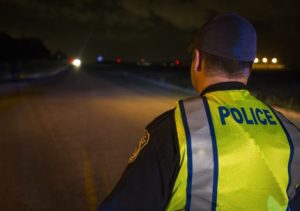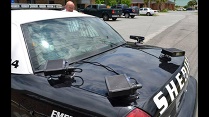Written by Shelia Dunn, NMA Communications Director with Joe Cadillic, MassPrivatel Blog
Street Surveillance Watch Blog comes to you biweekly on the National Motorists Association Blog.
We started this blog because the proliferation of street surveillance continues unabated and has a significant impact on the driving public. We will do our best to give you the facts and discuss how they may threaten our privacy.
Here at the NMA, we curate daily a Driving News Feed and send out the Driving News Daily email (subscribe here). Over at MassPrivateI, Joe has been publishing a list of Weekly Privacy/Civil Rights News Stories. To make motorists more aware of the various threats to everyone’s privacy, we have decided to focus on a few issues bi-weekly.
Every two weeks on the NMA Street Surveillance Blog, Joe and I will discuss a topic in an interview format that we think the public should be made aware of and give actions that could be taken to curb street surveillance in your community.
If you have comments or suggestions, write a comment after this blog or contact us at nma@motorists.org.
Surveillance during the Time of the COVID-19 Crisis
Over the past few months, we have noticed a disturbing trend by officials to use COVID-19 as an excuse to monitor motorists in disturbing ways.
Here are just a couple of the stories that have appeared in the NMA’s Driving News Feed:
- COVID-19 Surveillance Must Not Be Used as an Excuse to Entrench Surveillance
- Fears for civil rights mount amid the fight against COVID-19
Here are two recent posts on the National Motorists Association Blog. I wrote the first and the second listed is from our Massachusetts activist John Carr:
- Roadblocks and Checkpoints during the COVID-19 Crisis: Driving in America Blog for April 3, 2020
- The age of fear
Joe also wrote a couple of blog posts on the various surveillance topics (there are many) entrenched in response to the pandemic crisis:
- What’s Next, Mandatory Coronavirus Checkpoints?
- Facial Recognition Companies Profit from COVID-19 by adding Thermal Imaging

Shelia: What do you see as some of the emerging surveillance issues?
Joe: I see authorities using COVID-19 to question and interrogate drivers at state borders as a huge privacy/Bill of Rights issue (4th Amendment).
More and more state and local will likely start authorizing police to hold checkpoints to screen out-of-state drivers just like recently in the state of Delaware.
As states like Florida and Delaware use COVID-19 as an excuse to screen out-of-state drivers, the need to educate motorists about their rights could not be more critical.
| Shelia: What is happening at these border checkpoints? Do people have to show papers? Are they arrested, or are they turned around and told to go back? Joe: As far as I can tell state border checkpoints are a lot more intrusive than standard DWI checkpoints. Motorists are required to essentially fill out travel papers at state weigh stations and rest stops. WCTV in Florida reported on a border checkpoint: “The checkpoint was a little more extensive for those traveling from New York or Louisiana. They were required to fill out paperwork about their health and recent travel before a decision was made regarding their entrance into the Florida border.” It is never a good idea to talk to a police officer about anything, let alone willingly divulge your travel history or your health. I am hopeful that someone will bring a class-action lawsuit against this highly intrusive behavior. I am hopeful that refusal means being denied entry on state highways only. Whether avoiding state highways to get into a state is a prosecutable offense remains to be seen.
Shelia: How does the use of personal tracking with cellphones, ALPRs and GPS location devices allowed by police when tracking like this need a warrant? Joe: Presently, the Trump administration is considering using geolocation devices to track people suspected of having COVID-19. Automatic License Plate Readers (ALPRs) are indiscriminate when it comes to tracking people’s movements. Of far more significant concern, though, is the use of ALPRs by private communities. Imagine an entire community using ALPRs to track your comings and goings and giving that information to law enforcement or your neighbors. In-vehicle GPS devices like a vehicle’s infotainment system are a double-edged sword. They offer motorists commercial-free music while revealing your location in real-time, from start to finish. Your Bluetooth devices (smartphones, tablets) are being identified and read by state and city officials in real-time. The sad truth is Bluetooth readers span the country and are being used by law enforcement and data brokers to track your every movement. Since vehicles are essentially smart computers on wheels, it is nearly impossible to stop government agencies from tracking everyone. But they’re a few steps people can take to mitigate their public footprint. If you value your privacy, demand accountability for ALPRs in your area, especially in smaller communities. To avoid having your phone tracked while driving, it’s always a good idea to turn it off or, at the very least, turn off your Bluetooth.
Thank you, Joe! I will check with you in a couple of weeks for the next edition of the NMA’s Street Surveillance Watch Blog. |
As part of this blog, we will also present the top five stories from that past several weeks for you to read regarding street surveillance. Here is this week’s list.
- Ring’s Expanding Public-Private Panopticon Doesn’t Actually Stop Crime
- Edge-based mobile ALPR system offers greater awareness and analytics
- California: Police plan to install surveillance cameras in San Leandro
- Baltimore aerial surveillance agreement: $3.7 million price tag, privacy protections, evaluation plan
- Minnesota trialing Bluetooth’ tags’ to warn drivers about highway work zones
If you would like to keep track of the many issues currently involved in street surveillance, check out Joe’s blog called MassPrivatel. Also, take a daily peek at the NMA’s Driving News Feed or subscribe to Driving News Daily, a five times per week email.
Thank you for reading the NMA’s Street Surveillance Watch Blog!







